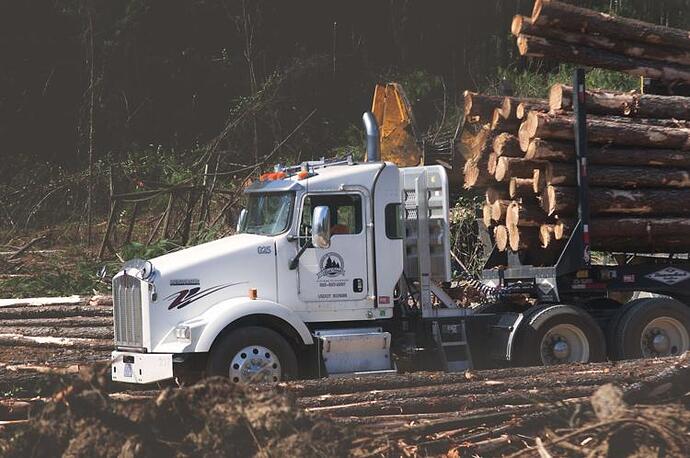COLUMBIA — South Carolina loggers are sounding the alarm over a burgeoning crisis facing the state’s timber industry, saying recent market disruptions are leading the more than $23 billion industry to the brink of what some contend is a catastrophic collapse.
In a March 6 hearing before the state Senate’s Fish, Game and Forestry Committee, several leaders in the state’s timber industry warned the closures of several mills in North and South Carolina have left them with no place to process their raw materials at a time they are growing more trees than ever, leaving them with cratering prices for their goods and threatening them with closure.
Last year, a paper mill in Canton, North Carolina, owned by Pactiv Evergreen closed its doors, taking with it dozens of jobs and a critical processing facility for South Carolina’s logging industry, which provided just under half of the facility’s raw material.
Months later, WestRock, another milling company, announced it would be closing down its mill in North Charleston, taking with it an additional 550,000 tons of processing capacity.
The closures have since created a bottleneck for South Carolina’s foresters who plant 1.38 trees for every tree they remove from the ground, according to industry statistics. With few options to turn to if they want to turn their trees into usable paper products, the entire industry is now unable to access the market at a time the global demand for new sources of wood product has been spiking.
“We have a grossly out of balance, supply and demand problem,” Thurston Chavis, president and CEO of Columbia-based forestry firm Milliken Advisors, told members of the Senate Fish, Game and Forestry Committee in early March.
And the state has a lot to lose: Per the state Forestry Commission, logging and its related industries ranked number one in the total number of jobs across the state, number two in overall labor income, and number three in direct economic output. For comparison, the money brought into South Carolina by forest products each year is surpassed only by sectors like tourism, which generated some $29 billion in economic activity last year.
Paper giant that closed its SC mill 2 weeks ago is being sold for $11B
- By John McDermott jmcdermott@postandcourier.com
The drop-offs seen in the industry have been severe.
After years of revenue declines since reaching highs in 2017 and 2018, South Carolina’s forestry sector saw a 98 percent drop in real gross domestic product in the third quarter of 2023 at a time overall growth was at 28 percent — a disparity Chavis warned could cause lumber facilities to go out of business or the state’s productive forestlands converted to more profitable uses, like residential or commercial development.
“We’ve learned to grow more wood, but we’ve not learned to consume more wood,” Chavis said. “We have a finite milling capacity here and they can they can only mill so much wood, which tells us we need to find new markets for our wood.”
Federal regulations could make getting that product out even more difficult.
Last winter, the Environmental Protection Agency announced it was weighing plans to tighten air quality standards for fine particulate matter by as much as 25 percent. And paper mills are notorious polluters. In 2021, the EPA fined a Catawba-based facility with ties to New England Patriots owner Robert Kraft $1.1 million after it was found to be releasing excessive amounts of hydrogen sulfide into the air, prompting thousands of complaints.
But demand for wood products internationally has also been spiking.
Charleston port CEO highlights ‘bold’ $2B investments to keep SC globally competitive
- By John McDermott jmcdermott@postandcourier.com
Many members of the European Union stopped trading with Russia — one of the world’s largest exporters of wood products — after its unprovoked military incursion into neighboring Ukraine in early 2022.
And the European Union as a whole recently adopted new forest management plans that, by 2030, will place a greater emphasis on forest conservation than on their ability to harvest timber. Given the region’s growing reliance on wood pellets and biomass for heat and energy, the European Union is considered one of the largest potential markets for wood products in the world.
Right now, however, the only places capable of profitably exporting wood pellets are the ports in Wilmington, North Carolina and Savannah, Georgia — places too far remote for some South Carolina producers to make it worth their while.
“It’s a growth market,”Tim Adams, a resource development manager for the South Carolina Forestry Commission, said of the EU markets. “But we really need a bulk shipping facility to get them there. Most of the pellets, or wood chips for that matter, that are shipped are shipped bulk, and not in containers. It is cost prohibitive to ship them in containers. We don’t have a bulk loading facility at the Charleston port.”
The industry is already working to address its milling capacity issues. Chavis said his company has obtained several letters of support to pursue constructing another production facility somewhere in South Carolina, though it will be nowhere near the capacity WestRock provided.
Meanwhile, Gov. Henry McMaster’s office has already announced it is weighing a $55 million appropriation in this year’s budget to purchase the shuttered facility in an effort to increase export capacity out of North Charleston, a move that will presumably help bolster the state’s timber industry.
But nothing will happen, Chavis told The Post and Courier, until the industry has a guarantee it can actually move the product it produces.
“Nobody in the right mind is going to sign an agreement without the ability to deliver the product,” Chavis said. “But then the port is not going to build anything unless you have signed contracts. So we’re in this game of Whac-a-Mole.”
